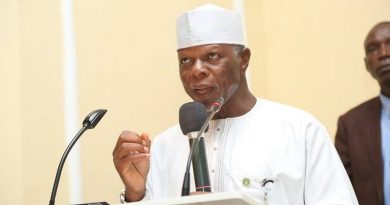Nigeria to leverage on proposed U.S. trade pact extension to strengthen naira expert say
The U.S. Congress has put forward proposals to extend to 2041 the African Growth and Opportunity Act (AGOA) – which allows Sub Saharan African countries to export products worth about $7,000 duty and tariff-free to the United States. It was supposed to end 2025.
Experts say the extension is to enable countries like Nigeria, which did not take full advantage of it to do so now especially in earning foreign exchange and strengthening its local currency amid current acute dollar scarcity.
This is an opportunity expert say Nigeria should take advantage to export its local products to the world’s biggest market as there is a high possibility the agreement would be extended.
AGOA, a U.S. trade initiative established in 2000, allows African nations to export various products, especially non-oil goods, to the United States on favourable terms, thereby promoting economic development and trade on the continent.
But whereas countries like South Africa, Kenya, Madagascar, Lesotho, and Ghana dominated the non-oil AGOA exports, accounting for 90 per cent of the total non-oil in 2022, Nigeria’s non-oil AGOA exports have remained stagnant, primarily comprising a few agricultural products and handicrafts.
Experts attribute Nigeria’s low non-oil AGOA exports to the lack of competitiveness of the country’s manufacturers. They stated that the country must make its products competitive by addressing major challenges limiting manufacturing in the country.
Also, they urge the federal government to be intentional in growing its non-oil exports by building an export capacity and culture that will ensure the country does not miss out on this new opportunity provided by the U.S. government.
“Nigeria’s low AGOA non-oil export is a reflection of the challenges of our manufacturing sector,” said Muda Yusuf, chief executive officer at the Centre for the Promotion of Private Enterprise (CPPE) in response to questions.
“Our cost of production is too high for us to be able to make any significant impact as far as export is concerned and this is why primary products export has continued to dominate,” Yusuf said.
“Lack of competitiveness is the reason why most of our manufacturers are inward-looking and more dependent on domestic than international markets,” he added.
Nigerian businesses spend billions of naira sourcing alternative energy to keep their factories alive. In a June 2023 statement, the Manufacturers Association of Nigeria put the annual economic loss caused by the inadequate power supply at N10 trillion, accounting for almost two per cent of the country’s Gross Domestic Product.
“AGOA is one of many export opportunities that we have failed to utilise to grow our non-oil because we have never been intentional,” said Obiora Madu an export consultant and the director-general of the African Centre for Supply.
“For us to start exporting and do it well, we need to build an export culture and capacity,” he noted.




